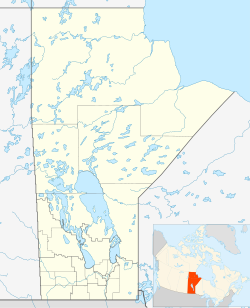RCAF Station Paulson
| RCAF Station Paulson | |||||||||||
|---|---|---|---|---|---|---|---|---|---|---|---|
| Near Dauphin, Manitoba in Canada | |||||||||||
| Coordinates | 51°08′N 99°52′W / 51.133°N 99.867°W | ||||||||||
| Site information | |||||||||||
| Operator | Formerly Royal Canadian Air Force | ||||||||||
| Site history | |||||||||||
| Fate | Sold, reverted to agricultural use. | ||||||||||
| Garrison information | |||||||||||
| Garrison | No. 7 Bombing and Gunnery School | ||||||||||
| Airfield information | |||||||||||
| Identifiers | IATA: none, ICAO: none | ||||||||||
| Elevation | 884 ft (269 m) AMSL | ||||||||||
| |||||||||||
| Airfields | |||||||||||
RCAF Station Paulson was a Second World War, British Commonwealth Air Training Plan facility located near Dauphin, Manitoba, Canada.
History
[edit]The base was home to No. 7 Bombing and Gunnery School. The proximity to a lake (Dauphin Lake) was important since the lake could be used for bombing and gunnery practice. Wing Commander W. I. Riddell was the first commanding officer when the school opened in 1941.[1] The station magazine was the "Paulson Post". The school closed 2 Feb 1945 and the Station was decommissioned shortly after.[2] The former airbase was abandoned[3] and has reverted to agricultural use.
Aerodrome
[edit]In approximately 1942 the aerodrome was listed as RCAF Aerodrome - Paulson, Manitoba at 51°08′N 99°52′W / 51.133°N 99.867°W with a variation of 13 degrees east and elevation of 884 ft (269 m). Three runways were listed as follows:[4]
| Runway Name | Length | Width | Surface |
|---|---|---|---|
| 14/32 | 2,700 ft (820 m) | 150 ft (46 m) | Hard surfaced |
| 8/26 | 2,700 ft (820 m) | 150 ft (46 m) | Hard surfaced |
| 2/20 | 2,700 ft (820 m) | 150 ft (46 m) | Hard surfaced |
RCAF Station Paulson today
[edit]Currently the runways are overgrown but they and the footprints of the buildings are visible in satellite imagery of the area with the foundations of the hangars being most visible due to their lack of overgrowth. There are still a few concrete buildings that are partially standing which are visible from Provincial Trunk Highway 20 which passes near by.
References
[edit]- ^ "Big Air School Opens". The Gazette. Montreal. June 24, 1941. Retrieved June 12, 2012.
Training started here today in one of the biggest bombing and gunnery schools to be established in Canada under the British Commonwealth Air Training Plan.
- ^ Hatch, F. J. (1983). The Aerodrome of Democracy: Canada and the British Commonwealth Air Training Plan, 1939-1945. Ottawa: Directorate of History, Department of National Defence. ISBN 0660114437.
- ^ Anon (2009). "Abandoned Aerodromes". Canada Flight Supplement Effective 0901Z 12 MArch 2009 To 0901Z 7 May 2009. Ottawa: Nav Canada. p. A35.
- ^ Staff writer (c. 1942). Pilots Handbook of Aerodromes and Seaplane Bases Vol. 2. Royal Canadian Air Force. p. 17.

